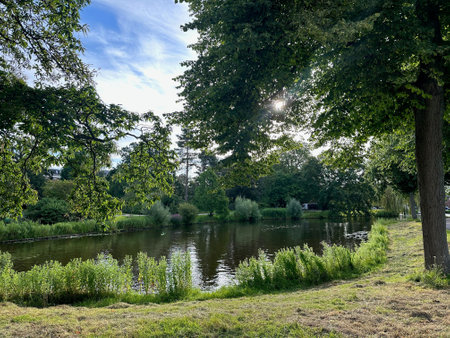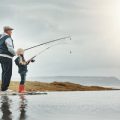1. The Origins of Carp Fishing Tournaments in the UK
Carp fishing tournaments hold a special place in the tapestry of British angling culture, with their roots stretching back to a time when the pursuit of specimen fish was more about camaraderie and local bragging rights than formalised competition. Unlike many modern sports, carp angling competitions in the UK evolved organically from informal gatherings by lakes and riversides—an evolution shaped by the distinctive landscape, climate, and social fabric of Britain.
The Early Days: From Pastime to Passion
In the post-war years, especially during the 1950s and 1960s, the popularity of carp fishing began to surge across England. While match fishing for species like roach or bream had long been established, carp presented a new challenge due to their elusive nature. Enthusiasts started to organise informal meets, sharing tips, stories, and even competing to catch the biggest specimen. These get-togethers often took place at renowned waters such as Redmire Pool—now legendary for its record-breaking catches and role in shaping British carp angling lore.
Key Milestones in UK Carp Angling Competitions
| Year | Event | Significance |
|---|---|---|
| 1951 | First British Carp Record at Redmire Pool | Sparked widespread interest in specimen carp fishing |
| 1960s | Formation of Carp Anglers Group (later BCAS) | Brought enthusiasts together; shared best practices |
| 1978 | Establishment of British Carp Study Group (BCSG) | Pioneered formal record-keeping and knowledge sharing |
What Set British Competitions Apart?
The unique developments that set UK carp fishing tournaments apart from continental events were rooted in tradition and respect for the environment. Unlike some countries where commercialism quickly took hold, British anglers fostered a strong ethos of conservation, catch-and-release, and discreet sharing of ‘secret’ waters. This cultivated a community-driven scene rather than cut-throat rivalry, laying foundations for today’s blend of competitive spirit and environmental stewardship that defines UK carp angling tournaments.
2. The Evolution of Tournament Formats and Rules
Carp fishing tournaments in the UK have come a long way since their humble beginnings. In the early days, informal matches were typically organised by local angling clubs with rather relaxed rules and a straightforward “biggest fish wins” approach. Over time, as the sport gained popularity, tournament formats and judging methods evolved significantly to ensure fairness, encourage skill development, and protect fish welfare.
Early Days: Simplicity and Community
Back in the 1970s and 1980s, most carp fishing contests were one-day affairs. Anglers drew pegs at random, set up camp, and fished for a set period—usually from dawn until dusk. The heaviest single carp would often clinch the win. Judging was informal; a simple weigh-in at the end sufficed, and disputes were rare thanks to the tight-knit nature of local clubs.
Modern Formats: Structure and Strategy
Today’s competitive landscape is far more sophisticated. Modern tournaments can span multiple days, sometimes even an entire week, with teams or pairs competing across large venues. Match organisers now employ strict peg allocations, rotating swim draws to level the playing field. The focus has shifted from just catching the biggest carp to accumulating the highest total weight—a change that rewards consistency over luck.
Main Differences: Then vs Now
| Aspect | Traditional Matches | Modern Tournaments |
|---|---|---|
| Duration | 1 day | 2-7 days |
| Format | Individual, single largest carp | Teams/pairs, total weight caught |
| Peg Allocation | Random draw, static swim | Rotating swims/pegs for fairness |
| Judging Method | End-of-match weigh-in | Regularly scheduled weigh-ins (e.g., every 4 hours) |
Rule Refinement: Fairness and Fish Welfare
The development of tournament rules has mirrored advancements in angling ethics and technology. Livewell systems and unhooking mats are now mandatory to minimise harm to carp during handling. Barbless hooks are often required to reduce injury risk. Organisers have introduced real-time scoring systems and independent marshals to ensure transparency. Penalties are imposed for rule infractions such as bait overuse or improper fish handling—reinforcing both sportsmanship and conservation.
Cultural Impact on Rules and Formats
The British penchant for fair play and camaraderie is deeply embedded in tournament structures. Rules continue to evolve through consultation with top anglers and governing bodies like the Angling Trust, reflecting a collective desire to balance competition with respect for nature. This ongoing evolution is a testament to how British carp angling culture values tradition while embracing innovation.
![]()
3. Key Competitions and Iconic Venues
When it comes to carp fishing tournaments in the UK, a handful of landmark competitions and legendary venues truly define the culture and spirit of the community. These events aren’t just about landing the biggest fish—they’re about camaraderie, tradition, and testing one’s mettle against some of the finest waters in Britain.
Flagship Tournaments on the Carp Calendar
| Tournament | Location | Distinguishing Feature |
|---|---|---|
| British Carp Angling Championships (BCAC) | Multiple venues nationwide | The premier national competition with a knockout format and televised final |
| Carp Team England Trials | Rotates between leading fisheries | Selects the elite for international representation at World Carp Classic |
| Eric’s Angling Carp Cup | Eric’s Willows Lake, Yorkshire | Known for its challenging pegs and hefty prize pot |
Iconic Lakes and Fisheries at the Heart of UK Carp Culture
- Linear Fisheries, Oxfordshire: Widely regarded as the beating heart of match carping, Linear boasts multiple lakes such as Brasenose One and Oxlease, renowned for their fair pegging and consistent catches during big matches.
- Naseby Reservoir, Northamptonshire: A historic venue that has hosted countless grassroots competitions, known for its friendly atmosphere and excellent stock of both commons and mirrors.
- St John’s Lake, part of Linear Complex: Regularly features in high-profile finals due to its reputation for producing record-breaking carp under pressure.
The Role of Venues in Community Spirit
The importance of these venues goes beyond their fish stocks or facilities. They serve as gathering grounds where friendships are forged on bivvy banks, tactics are exchanged over brews, and legends are born with every epic capture. The blend of heritage-rich waters like Redmire Pool—with its mythic status—and modern competition-focused complexes ensures there’s something for everyone, from old-school anglers to new-generation carpers.
What Makes These Tournaments Integral?
The shared experience at these iconic spots cements their place in angling folklore. From the electric buzz at a BCAC final weigh-in to quiet moments watching dawn break over Linear’s misty waters, these competitions and venues encapsulate what makes UK carp fishing unique: a blend of rivalry and respect, underpinned by a deep love for Britain’s natural landscapes and a sporting tradition that unites communities year after year.
4. The Social and Cultural Impact of Carp Fishing Tournaments
Carp fishing tournaments in the UK are far more than just competitive angling—they’re steeped in a rich tapestry of social customs, camaraderie, and enduring traditions that define British rural life. For many participants, these events serve as annual milestones, bringing together friends, families, and local communities in a shared celebration of skill and heritage.
Unpacking Camaraderie Among Anglers
One of the most cherished aspects is the sense of camaraderie that develops on the bankside. Whether it’s sharing a cuppa at dawn or exchanging tales of the one that got away, anglers often forge lifelong friendships through these tournaments. This social glue is what keeps many returning year after year, regardless of who takes home the trophy.
Rituals and Traditions Unique to Britain
The UK boasts its own unique rituals surrounding carp angling events. From pre-match draw ceremonies where swims are allocated, to communal barbecues and prize-giving banter at the end, there’s a rhythm to these gatherings that is instantly recognisable to seasoned British anglers. Many clubs uphold traditions such as “the first brew,” where everyone gathers for tea before lines hit the water—an essential nod to both hospitality and heritage.
Common Social Traditions at UK Carp Fishing Tournaments
| Tradition | Description |
|---|---|
| The Draw | A random allocation of fishing spots, fostering fairness and anticipation among competitors. |
| The First Brew | An early morning gathering over tea or coffee, setting a friendly tone for the day ahead. |
| Bivvy Banter | Casual chats and story-swapping in bivvies (tents), often lasting well into the night. |
| Prize-Giving Ceremony | Celebratory event with trophies, applause, and good-natured ribbing among participants. |
Socio-Cultural Significance
Beyond their sporting appeal, carp tournaments act as crucial social glue in many rural communities. They offer a space for all generations to mingle—from weathered veterans passing down tips to young hopefuls casting their first line. These gatherings foster respect for nature and reinforce values like sportsmanship, patience, and humility—qualities deeply woven into Britain’s angling culture.
The Role of Clubs and Local Communities
Local angling clubs play a pivotal role in sustaining these traditions. Through regular matches and fundraising events, they not only nurture talent but also support local causes—whether it’s conservation projects or charity drives. In this way, carp fishing tournaments become more than personal achievements; they’re collective celebrations that reflect the heart and soul of British outdoor life.
5. Tactics, Equipment, and Preparation for UK Tournaments
When it comes to carp fishing tournaments in the UK, seasoned anglers know that a blend of tactical nous, quality gear, and meticulous preparation makes all the difference. Unlike casual fishing or social sessions, tournament angling demands a razor-sharp focus on efficiency, adaptability, and local knowledge.
Tournament Tactics: Beyond Just Casting Out
Success in UK carp competitions hinges on understanding watercraft—reading the venue, monitoring weather patterns, and observing fish behaviour. Pre-baiting is common but must be done with respect to venue rules and local ecology. During tournaments, many top anglers use a variety of rigs and frequently adjust presentation based on real-time feedback from the water.
Popular Techniques Used in UK Competitions
| Technique | When to Use | Key Advantages |
|---|---|---|
| Zig Rigs | During warmer months or when fish are mid-water | Covers different depths; entices wary carp |
| Solid PVA Bags | Weedy or silty venues; short-range work | Tangle-free; compact bait delivery |
| Spodding/Spombing | To establish feeding areas at range | Accurate baiting; draws shoals to swim |
| Method Feeder | Smaller waters or pressured venues | Quick bites; appeals to opportunistic fish |
Choosing the Right Gear: British Preferences
The typical kit list for a UK carp tournament is a blend of robustness and subtlety. Most competitors opt for rods between 12ft–13ft with a test curve suited to both casting distance and control during play. Reels with quick-drag systems and reliable line lay are essential for rapid response to runs. In terms of terminal tackle, barbless hooks (often mandatory), supple hooklinks, and safe rig setups are standard practice, reflecting both competition rules and fish welfare concerns.
Essential Tournament Gear Checklist
| Gear Item | UK-Specific Note |
|---|---|
| Bivvy/Shelter | Makeshift weather protection is a must—British rain shows no mercy! |
| Bite Alarms & Indicators | Crisp audio cues help manage multiple rods under strict competition rules. |
| Landing Nets (42″ minimum) | Larger nets protect bigger specimens often found in UK lakes. |
| Unhooking Mats/Cradles | Required by most organisers for carp safety. |
| Bait Boat (venue-dependent) | A strategic edge for precise placement where allowed. |
| Tournament-Grade Weigh Slings & Scales | Certified equipment ensures fair play. |
Preparation: The Edge Before the First Cast
No amount of fancy kit can make up for poor preparation. Pre-tournament recce trips allow you to map swims, assess underwater features, and get familiar with access routes—crucial when time is of the essence. Many UK anglers also fine-tune their bait choices to match local forage or mirror successful past tactics at the venue. Finally, brushing up on competition rules—peg draws, permitted baits, rod limits—is non-negotiable if you want to avoid unnecessary penalties.
Veteran’s Tip:
If possible, network with locals or returning competitors; even one nugget of information about previous winning pegs or productive spots can give you that vital edge come match day.
6. Notable Anglers and Legendary Moments
When it comes to carp fishing tournaments in the UK, the stories of legendary anglers and unforgettable moments are as much a part of the sport’s heritage as the lakes themselves. Over the decades, certain individuals have not only set records but have also helped to shape the culture and community spirit that define British carp fishing.
Celebrated British Carp Anglers
| Angler | Key Achievements | Contribution to the Sport |
|---|---|---|
| Rod Hutchinson | Pioneer of modern carp tactics, bestselling author, tackle innovator | Popularised advanced baiting methods, inspired generations through his writing |
| Kevin Nash | Founder of Nash Tackle, major tournament competitor, influential figure since 1970s | Raised standards for gear and ethics within UK carp fishing circles |
| Terry Hearn | Record-breaking catches at iconic venues like Yateley and Redmire Pool | Brought finesse and dedication into the limelight, widely respected for humility and skill |
| Ali Hamidi | Korda frontman, TV presenter (Monster Carp), innovative promoter of the sport | Made carp fishing accessible to new generations through media presence and educational content |
Legendary Moments That Shaped Carp Fishing Culture
- The Redmire Record (1951): Richard Walker’s capture of a 44lb carp at Redmire Pool set a new British record and proved that huge carp lurked in UK waters. This moment ignited national interest in specimen hunting.
- The Rise of Syndicate Waters: The formation of exclusive syndicates in the late 20th century led to some of the most competitive and coveted carp fishing environments. Epic captures at venues like Horton Church Lake became legendary tales told across the country.
- The BCAC (British Carp Angling Championships): This tournament has delivered countless dramatic finishes since its inception in 1998, with nail-biting weigh-ins and inspiring displays of teamwork under pressure.
- The First “50”: In 1980, Chris Yates famously landed the first authenticated British 50lb carp at Redmire Pool—cementing his place in angling folklore and raising ambitions for all who followed.
- The Social Media Era: Recent years have seen viral moments such as multiple forty-pounders caught on camera or live-streamed matches, giving today’s anglers instant recognition and broadening the sport’s appeal beyond traditional enthusiasts.
A Culture Built on Respect and Camaraderie
The tales of these individuals and their achievements go far beyond just big fish. Their contributions foster a culture of respect for both nature and fellow anglers—a cornerstone of every major UK tournament. Whether you’re sharing tea bankside or recounting epic battles with elusive monsters, it’s these stories that keep the spirit of British carp fishing alive and thriving for future generations.
7. The Future of Carp Fishing Tournaments in the UK
The landscape of carp fishing tournaments across the UK is poised for significant transformation in the coming years, shaped by both technological innovation and shifts within the angling community. While British anglers have always held tradition close to heart, there’s a palpable excitement around how the sport is evolving to meet modern expectations.
Anticipated Trends in Carp Tournament Angling
Looking ahead, several key trends are set to define the future of competitive carp fishing. These include increased digital integration, sustainability initiatives, and a stronger emphasis on inclusivity. Below is an overview:
| Trend | Description | Potential Impact |
|---|---|---|
| Digital Scoring & Live Streaming | Real-time scoring apps and live broadcasts of major events | Enhanced audience engagement, broader reach, and instant results |
| Eco-Conscious Practices | Greater focus on fish welfare and environmental responsibility | Improved public perception, healthier fisheries, and long-term viability |
| Diversity & Inclusion Efforts | Initiatives to attract young people, women, and underrepresented groups | A more vibrant and representative angling community |
| Innovative Formats | Introduction of team-based or short-session tournaments | Fresh challenges and broader appeal among participants |
| Sponsorship & Commercial Partnerships | Growth in brand involvement from tackle manufacturers and non-endemic companies | Bigger prize funds and improved event infrastructure |
The Role of Technology in Tournament Evolution
From online ticketing platforms to the use of drones for aerial coverage, technology is quickly becoming embedded in the fabric of UK carp fishing competitions. Mobile apps now allow for real-time catch reporting and leaderboards, making events more transparent and interactive for both participants and spectators. As a result, even grassroots matches are finding new audiences well beyond the bankside.
Sustainability as a Core Value
The British angling community has always respected nature, but recent years have seen an intensified commitment to sustainability. Organisers are implementing stricter fish-handling protocols, encouraging barbless hooks, and running educational campaigns about habitat protection. Expect these efforts to become standard practice as environmental concerns remain front and centre.
Evolving British Angling Culture through Competition
Tournaments have historically brought anglers together—whether for friendly rivalry or national prestige—and this spirit continues to evolve. Increasingly, events serve not just as contests of skill but as cultural gatherings that celebrate the heritage of British angling. From local club matches to internationally recognised championships like British Carp Angling Championships (BCAC), tournaments will continue to shape and reflect the values of their time.
The future promises a dynamic blend of old-school camaraderie with new-school innovation—ensuring that carp fishing tournaments remain at the very heart of Britain’s rich angling culture for generations to come.


